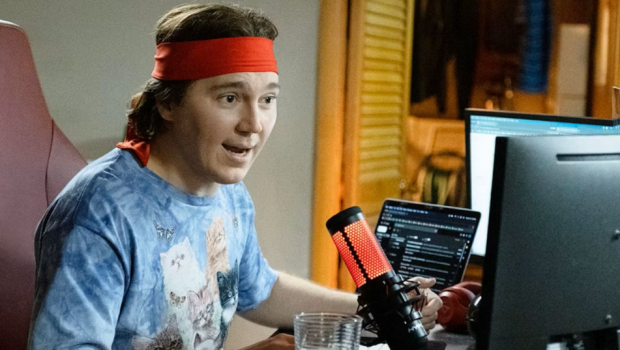Dumb Money – Film Review
Reviewed by Damien Straker on the 22nd of October 2023
Roadshow presents a film by Craig Gillespie
Written by Lauren Schuker Blum and Rebecca Angelo based on The Antisocial Network by Ben Mezrich
Produced by Aaron Ryder, Teddy Schwarzman, and Craig Gillespie
Starring Paul Dano, Shailene Woodley, America Ferrera, Pete Davidson, Vincent D’Onofrio, Nick Offerman, Anthony Ramos, Sebastian Stan, and Seth Rogen
Cinematography Nikolas Karakatsanis
Edited by Kirk Baxter
Music by Will Bates
Rating: MA15+
Running Time: 104 minutes
Release Date: the 26th of October 2023
Slick assemblage and an A-grade cast fail to overcome soft emotional stakes in Craig Gillespie’s GameStop comedy-drama Dumb Money. The film opens predictably by saying ‘based on a true story’. Yet the distinction matters. This is the first feature film about the GameStop memes stock saga. Internet users banded together online to beat Wall Street at its own game. They increased the value of an underappreciated stock only for the ‘empire’ to retaliate and stifle the movement. The US corporate establishment enjoys moving the goal posts. Who knew? The story’s appeal is clear. It is touted as an underdog story for millennials as though David and Goliath were armed with smartphones. This film’s exploration of corporate greed and underdogs is courtesy of screenwriters Lauren Schuker Blum and Rebecca Angelo. They previously wrote the show Orange is the New Black together. Now they have now adapted Ben Mezrich’s 2021 book ‘The Anti-Social Network’. Though they were not alone. Around nine different studios were interested in filming this same saga. Both HBO and Netflix have already released their own documentaries about GameStop. The bidding frenzy to tell and retell this same story suggests Hollywood is desperate for stories for millennials outside expensive, unreliable franchises. Gillespie’s treatment of Blum and Angelo’s script is serviceable. However, Money is unlikely to surprise or move anyone who has already delved into the online drama.
The story’s ‘David’ in this instance is Keith Gill (Paul Dano). He is a former Massachusetts financial analyst turned Internet celebrity. During the Global Pandemic, Keith livestreams his various financial tips to his online followers and leaves posts for them on the Reddit page ‘WallStreetBets’. While on camera he dons a red headscarf and the username ‘RoaringKitty’. He also allows people to see his balance sheet. His crucial stock tip is to invest in GameStop. Keith invests around $53,000 of his own money in the company. GameStop is a video game retail chain written off by most heavyweights. Yet due to complex short selling and various Reddit users following Keith’s advice, the stock price soars. Keith and his wife Caroline (Shailene Woodley) realise the money they are suddenly making is lifechanging. Keith’s brother, Kevin (Peter Davidson), is a lousy delivery driver and is shocked Keith is not immediately cashing out. Some of Keith’s followers include a nurse named Jennifer (America Ferrera), Marcos (Anthony Ramos) a GameStop employee, and two college students (Talia Ryder and Myha’la Herrold) who are in a relationship. Everyone is indecisive about selling up. Meanwhile, others panic. The bumbling Gabe Plotkin (Seth Rogen), a corporate big shot, tells his wife they are bleeding millions per day. The industry heavyweights, including Steve Cohen (Vincent D’Onofrio) and Ken Griffin (Nick Offerman), demand to know what is happening. Soon, Keith is subpoenaed and forced to testify before Congress for accusations of so-called market manipulation.
Money strongly reflects how challenging it is to stage a drama compared to a documentary. Tension in documentaries is drawn from recounts and commentary. The form is more reflective as subjects review past events. In a dramatisation like Money, character moments largely stem from the writer’s imagination. If that sounds daunting, imagine translating Reddit posts into compelling drama. Pray for the writers. Fortunately, there is no shortage of visual stimulation in Money. Between the dialogue, Gillespie intercuts visual gimmicks, including Internet videos and memes pivotal during the saga. The gimmicks paper over the creaky writing. Rather than showing forum posts, all the characters discuss their GameStop stocks. Bizarrely, this even includes Jennifer who is under the duress of nursing during the pandemic. The clunky dialogue and Gillespie’s cuts between the extensive roster dilute the comedy and drama. Consequently, the film lacks consistency. Tension only boils once the stock surges, and the characters contemplate selling up. Their actions and inactions reflect how changing fortunes hinge on the push of a button. Not all the little people win, which is realistic. Though the underdog theme and combating corporate greed is a touch fanciful. An article in the Sydney Morning Herald reports several hedge funds prospered enormously from the saga. The harder some Hollywood dramatisations include a life message the more they remind us we are simply watching a film.
The financial banter aside, Money would have been stronger if the drama prioritised Keith’s household. It never feels as though the gold mine Keith and Caroline are sitting on will threaten their relationship. There are words exchanged over a family dinner, but the personalities never erupt. The contrast between Keith and his brother, a man-child who can barely hold a job down, does not ignite either. Their bond is played for laughs and employs a flimsy movie coda about taking risks (running naked through a storm Kevin says). The only time Money dabbles into genuine emotion is briefly noting the death of Keith’s sister. The lack of personal conflict is strange given the film’s talent. Paul Dano and Shailene Woodley are excellent actors who can do little to distinguish their characters. After The Descendants (2011) and Big Little Lies (2017), the latter has a gift for creating warm, empathetic characters. Isn’t it time then that Hollywood wrote her a more compelling role that is befitting of her strong emotional range and naturalism? Why Pete Davidson and Paul Dano were cast as brothers is a mystery. Their energy and style are worlds apart. Yet Davidson with his cartoon-like features showcases good comic timing. He earned the most laughs at an early screening. In one of the funniest moments, he gushes over Democratic Congresswoman Alexandria Ocasio Cortez on TV. Casting the adolescent Seth Rogen as a bumbling corporate type (in a suit and tie no less) is another strange choice and so too is leaving big personalities like Vincent D’Onofrio, Nick Offerman, and Sebastian Stan sidelined. Thinning out the talent like this is one of the unfortunate drawbacks of cutting between so many different story threads.
The film is another example of why it is difficult turning real life stories into effective onscreen drama. Translating past events, especially Internet activity, into compelling screen time requires great finesse and imagination from writers and directors alike. The writers here have tried infusing a coda into the story about risk taking and holding one’s nerve under pressure. There is nothing profound or terribly wrong with that message. However, the clunky dialogue and cuts between a wide spectrum of characters dilute the tension for long stretches. The scenes only boil once the characters must decide on their fortunes. Higher stakes, particularly regarding Keith’s family, would have made the film more emotional and given the key actors more depth. Instead, Gillespie steers proceedings between complicated financial dealings and light comedy without pushing any major creative boundaries. It reminds us of why his film I, Tonya (2017) was so memorable. Its brutality felt distinctive, tangible, and real. This entry spreads itself thin when on paper its cast suggests it could have been more affecting.
Summary: Dumb Money spreads itself thin when on paper its cast suggests it could have been more affecting.










